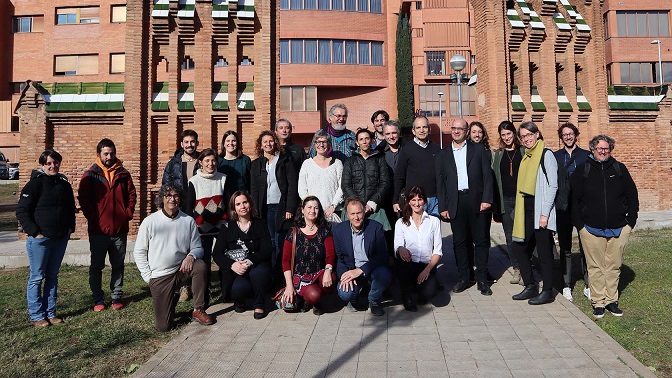UPWATER: New project preventing groundwater pollution
As part of a new international research project, Department of Environmental Science researchers will investigate the use of natural processes in landscape-integrated prevention of groundwater pollution.

UPWATER: preventing groundwater pollution
Groundwater forms a high proportion of the EU’s drinking water supply, yet the quality of this essential resource is threatened by contamination, putting long-term water security at risk. The UPWATER project rises to this challenge with an ambitious workplan, and over the next three-and-a-half years promises to deliver tools for better protection of groundwater from biological and chemical contaminants.
By improving our knowledge of groundwater pollution sources and pathways in combination with assessing the effectiveness of different preventative measures, the team, formed of European and Australian organisations, will develop tools and strategies to enable safe and contaminant-free recharge of groundwater. Involving stakeholders, including water agencies, policymakers, and citizens, the project also aims to invite wide participation and input, as well as increasing awareness of engineered natural treatment systems for enhancing water quality.
At Aarhus University’s Department of Environmental Science (ENVS), the project’s focus is on the use of natural processes to remove micropollutants from old dumping grounds. This work will be done in collaboration with Region Sjælland, and the Stengården losseplads site; an earlier gravel pit that was used as a dumping ground for over a decade before closing in 1984. Industrial pollution, polluted soil, and sewage dumped here leached into the groundwater, requiring painstaking water treatment at the Region’s plant. Today, the site serves not only as a warning, but as a fertile test ground for learning and research.
Biofilm-based reactors coupled with biofilter systems are an engineered natural treatment system that will be investigated for removing residual iron and micropollutants such as pesticides from production residues, at pilot scale. Such solutions have the additional benefit of being integrated into the landscape. Professor Kai Bester and colleagues are aiming to use this treatment system to achieve concentrations below the threshold for safe drinking water, so that groundwater may be extracted again in the vicinity in future.
The research at the Danish site will form one of three case studies, alongside two further in Greece and Spain, to represent different EU climate conditions and a combination of rural, industrial and urban pollution sources. Results from these investigations will contribute to designing effective at-source measures to prevent pollution of groundwater using technical and non-technical methods, including regulatory and governance approaches.
UPWATER project details:
The work is funded under the Horizon Europe ‘Clean Environment and Zero Pollution’ call, and the consortium is formed of 11 European organisations, and 2 associated organisations from Australia; coordinated by the Institute of Environmental Assessment and Water Research in Spain:
- Institute of Environmental Assessment and Water Research (IDAEA-CSIC), Spain
- Aarhus University, Denmark, center for advanced water purification
- Institut National de L’Environnement Industriel et des Risques (INERIS), France
- IWW Rheinisch-Westfälisches Institut für Wasserforschung gemeinnützige ( IWW Zentrum Wasser), Germany
- National Technical University of Athens, Greece
- Universitat de Barcelona, Spain
- Future City Foundation, Netherlands
- Fundacion Nueva Cultura del Agua (FNCA, New Water Culture Foundation, Spain
- TARH - Terra, Ambiente e Recursos Hídricos, Lda., Portugal
- Barcelona Regional Agencia Metropolitana de Desenvolupament Urbanístic d’infrastructures SA (Barcelona Regional), Spain
- Athens Water Supply and Sewerage Company (EYDAP), Greece
- The University of Western Australia, Australia
- Australian Nuclear Science and Technology Organisation (ANSTO), Australia
Read more and keep up to date with the project via the UPWATER website (https://www.upwater.eu/), and LinkedIn page (https://www.linkedin.com/company/upwater/).
